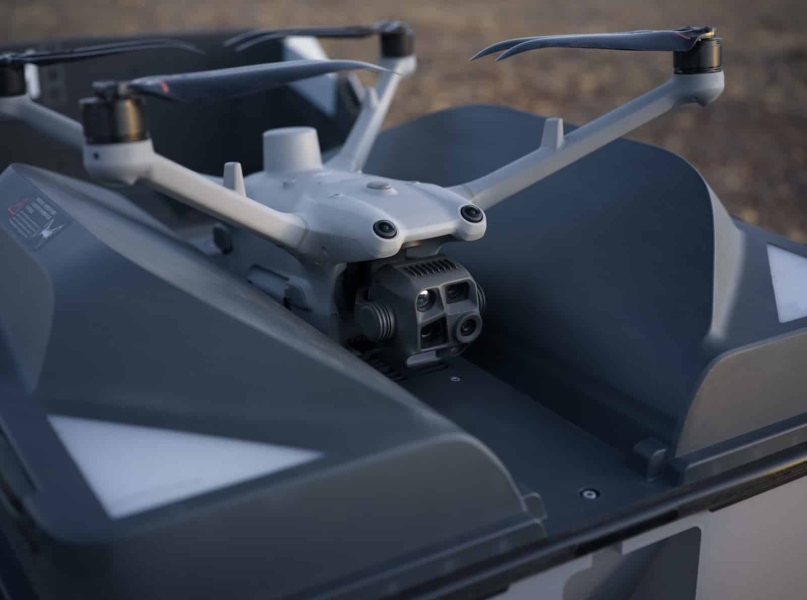DJI Drones Near Fort Bliss Trigger Army Security Assessment

Snag the 2025 Apple MacBook Air M4 13-inch for $799 (Save $200!) – Limited Amazon Deal!
Fort Bliss officials are conducting a security risk assessment after discovering El Paso’s citywide DJI drone program operates adjacent to the Texas military installation without prior notification. The Chinese-made drone fleet, unveiled September 2, has prompted the 1st Armored Division to evaluate potential threats from unmanned aerial systems near the Army’s primary tank unit headquarters.
The controversy underscores growing tensions between local public safety needs and national security concerns over foreign drone technology, reports KFOX14. El Paso’s program places Chinese-manufactured aircraft within close proximity of Biggs Army Airfield, a critical component of Fort Bliss’s role as a U.S. military “power projection platform” for global deployments.
$628,700 Investment Raises Military Concerns
El Paso’s drone program represents a significant municipal investment, with the city spending $628,700.93 since 2021 on DJI equipment and related hardware. The program features 22 strategically positioned drone docks across the city and employs 40 licensed pilots supporting police, fire, and airport operations. Approximately half of these pilots work at El Paso International Airport, which sits directly adjacent to Fort Bliss.
Major William McGehee, deputy public affairs officer for the 1st Armored Division, issued a pointed statement regarding the lack of coordination:
“Fort Bliss was not made aware in advance of the City of El Paso’s use of foreign-manufactured drones around or near the installation. The installation takes all potential security concerns seriously and is assessing any potential risks associated with unmanned aerial systems operating in close proximity to the base.”
The military’s concern reflects broader federal policy, as all federal agencies including the Department of Defense are legally prohibited from purchasing or operating DJI drones due to security risks. Texas state agencies face similar restrictions on Chinese drone equipment.
NDAA Deadline Creates Urgency
The 2025 National Defense Authorization Act intensifies pressure on the situation by mandating a national security review of Chinese drone manufacturers, including DJI and Autel Robotics. Federal agencies have until December 23, 2025, to complete the assessment. If security risks are identified or the review remains incomplete, the Federal Communications Commission must ban new DJI product sales in the United States.
DJI’s Wayne Baker, Director of Stakeholder Engagement, acknowledged the regulatory challenge in a September 2 interview with KFOX14/CBS4, stating the company “would love to see this audit done, you know, timely, fairly, and accurately.” He warned that failure to complete the review would result in “no new products could be brought into the US, potentially as it’s written now.”
City Defends Program Security
El Paso officials maintain their drone operations pose no security threat, emphasizing that collected data remains on an independent network supported by AWS Cloud infrastructure, inaccessible to DJI. City spokesperson Laura Cruz-Acosta stated that El Paso “has maintained communication with Fort Bliss regarding matters of mutual concern, including the use of technology to support public safety.”
The city’s defense highlights the economic reality facing municipalities nationwide. Officials argue that purchasing U.S.-manufactured drones would be cost-prohibitive, noting that Chinese companies dominate the commercial drone market. This cost differential has led numerous cities to adopt DJI platforms despite growing federal scrutiny.
Industry Impact and Operational Benefits
El Paso’s program, developed in partnership with DJI since 2018, demonstrates the operational advantages driving municipal adoption of Chinese drone technology. The system enables rapid emergency response deployment across the city’s 256 square miles (663 square kilometers), with drones providing real-time surveillance and reconnaissance capabilities for first responders.
The financial breakdown reveals the program’s growth trajectory: El Paso invested approximately $36,346 in 2021, followed by a substantial $592,000 expansion in 2024. These expenditures covered not only aircraft but also supporting equipment including specialized cameras and battery systems essential for continuous operations.
DroneXL’s Take
The El Paso-Fort Bliss situation exposes a critical vulnerability in how American cities navigate drone procurement amid escalating geopolitical tensions. While municipalities rightfully prioritize cost-effective public safety tools, the complete lack of military coordination raises serious questions about interagency communication protocols. This case will likely become a bellwether for similar conflicts nationwide as the NDAA deadline approaches.
The broader implications extend beyond El Paso. If federal agencies fail to complete the mandated DJI security review by December 2025, thousands of municipal drone programs could face equipment obsolescence, potentially compromising public safety capabilities. Conversely, if the review proceeds and identifies genuine security risks, cities may be forced into expensive transitions to domestic alternatives.
The timing couldn’t be more critical for the drone industry. Will this controversy accelerate American drone manufacturing capabilities, or will economic realities force a reconsideration of blanket Chinese technology restrictions? What’s your perspective on balancing local operational needs with national security concerns? Share your thoughts in the comments below.
